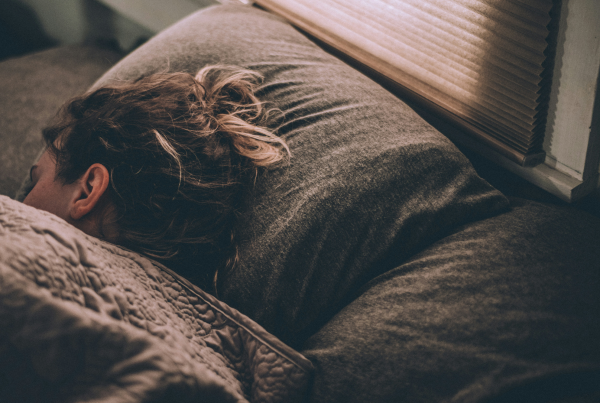Sleep is a critical biological process that serves numerous vital functions, including memory consolidation and emotional regulation. Especially in psychiatry, the mental health implications of sleep deprivation are well known. While disrupted sleep in the form of insomnia, nightmares, or sleep apnea are often recognized as physical symptoms of psychiatric conditions such as PTSD or anxiety disorder, poor sleep quality can also contribute to the onset, frequency, and duration of mental health difficulties [1]. Not only does sleep deprivation increase distress and anxiety in those with no prior mental health conditions, it may also exacerbate symptoms like psychosis and suicide ideation with ongoing mental health challenges [2]. Clearly, maintaining good sleep habits is a major priority for mental health providers, but the scope of its importance extends beyond that. One of the most critical roles sleep plays is in maintaining a robust immune system. The relationship between sleep and immunity is complex and mutual—good sleep enhances immune function, while immune challenges can affect sleep patterns. Especially with flu activity typically having its peak between December and February, understanding how sleep can play a role in preventive medicine is all the more helpful [3]. This article delves into the science behind this relationship, bridging mental and physical help, explaining how sleep supports the immune system and how lack of sleep can undermine it.
Enhancing Immune Function through Sleep
Recent research has revealed that sleep plays a crucial role in the activation of immune defenses. There are often overlaps in the associations connecting sleep and immune health that are mediated by stress, especially since sleep disturbance can be both a cause and consequence of stress. Below are some key ways that sleep supports the immune system:
Sleep Promotes Immune Cell Production and Activation
During sleep, the body produces and activates various immune cells, including white blood cells, or leukocytes, that are crucial for defending the body against infections. One of the most significant ways sleep impacts immunity is by enhancing the production of T-cells, which are involved in the recognition and destruction of infected cells in order to control and limit the impact of any given infection [4]. Low t-cell count is often a hallmark sign for immunocompromised individuals, and sleep is a significant part in replenishing this. T-cells are part of the adaptive immune system and require sleep in order to migrate to the lymph nodes where they mature and contribute to the larger immune response [5]. Specifically, growth hormone and prolactin, both hormones released during sleep, have been found to mediate this migration of T-cells.
One study found that when individuals were sleep-deprived, their T-cell response to an infection was significantly reduced, impairing the body’s ability to fight off pathogens [4]. Additionally, cytokines, which are signaling proteins that help regulate immune responses, are synthesized during sleep. Certain cytokines are involved in inflammation and the immune response to infection. These cytokine proteins essentially act as a whistle to get the attention of immune
cells and direct them to the site of an infection or injury [6]. Therefore, sleep disturbances, especially accumulated sleep debt over long periods, can lower cytokine production, which in turn affects the body’s ability to fight infections and heal from injury.
Enhanced Antibody Production
Antibodies are proteins produced by B-cells, another kind of immune cell, that help neutralize harmful pathogens. Research has shown that sleep enhances the production of these antibodies, improving the body’s ability to respond to specific infections. In a 2009 University of Chicago study, researchers found that people who got sufficient sleep after receiving a vaccine had significantly higher levels of antibodies compared to those who were sleep-deprived [7]. This highlights how sleep can boost the effectiveness of vaccinations by improving the immune response by priming its capacity for antibody production.
Regulating Inflammation
Inflammation, despite the colloquial understanding of it as a negative symptom, is a natural immune response to injury or infection. However, it is chronic inflammation that can lead to various health problems, including cardiovascular disease, autoimmune disorders, and metabolic diseases. Sleep plays a crucial role in regulating inflammatory responses.
Studies have shown that sleep deprivation increases the levels of pro-inflammatory cytokines, as opposed to anti-inflammatory cytokines, which can lead to chronic, dysregulated inflammation. For example, research published in The Journal of Immunology found that inadequate sleep leads to elevated levels of C-reactive protein (CRP), an inflammatory marker that is associated with an increased risk of heart disease [8].
Furthermore, adequate sleep reduces the production of cortisol, commonly known as the stress hormone although it is one of many released in times of stress [9]. Increased cortisol can suppress the immune system and increase inflammation when levels remain elevated over time. A good night’s sleep helps to balance cortisol levels, promoting a healthy immune response.
Promoting Immune Memory
Sleep is also essential for developing immune memory, a major function of the adaptive immune response. This is the process by which the immune system “remembers” previous infections or vaccinations and can mount a faster and more efficient response upon subsequent exposures. After a vaccination or infection, the body stores information about the pathogen, and immune memory is built during the sleep cycle [10].
Research shows that people who experience deep sleep after vaccination show enhanced immune memory. This means that sleep not only helps strengthen the immediate immune response, measured as the level of antibodies, but also improves long-term immunity, which can protect against future infections [11].
Sleep Deprivation Weakens the Immune System
At the beginning of the article, the relationship between sleep and immune strength was introduced as mutual. Just as sleep enhances immune function, insufficient or poor-quality sleep can weaken the immune system, making the body more susceptible to infections and diseases. Notice that both factors weigh into how sleep translates to health: not getting enough can be just as detrimental as sleep that is interrupted, in an uncomfortable environment, or trouble falling asleep. If you are interested in finding out more about the quality of your own sleep and the potential for health risks, this article by the Sleep Foundation provides a tool to measure your risk level [12].
In relation to flu season, sleep deprivation has a direct negative impact on the function of immune cells. A study published in The Journal of Experimental Medicine found that sleep deprivation reduces the efficacy of natural killer (NK) cells, which play a critical role in defending the body against viral infections and cancerous cells by differentiating between infected or abnormally-replicating cells and the body’s own cells. Sleep loss impairs this essential NK cell activity, adding to compounding effects of poor sleep on the immune system at large [13].
Sleep deprivation also increases susceptibility to common infections, such as the cold or flu. In a landmark study published in JAMA Internal Medicine, researchers exposed participants to the rhinovirus, the virus behind the common cold, and found that those who slept fewer than 6 hours per night were nearly four times more likely to develop a cold than those who slept 7 or more hours [14]. This demonstrates how sleep plays a crucial role in preventing the onset of illness. Especially for students, who experience intensified workloads around the same time as flu season, this may mean being disciplined with a sleep routine that is not compromised due to growing time commitments.
Conclusion
The link between sleep and immunity is undeniable. Sleep not only enhances immune function by promoting the production and activation of immune cells, cytokines, and antibodies, but it also regulates inflammation and improves immune memory. Conversely, sleep deprivation weakens the immune system, increasing susceptibility to infections, reducing the effectiveness of vaccines, and impairing the body’s ability to respond to pathogens.
Given the significant role sleep plays in immune health, prioritizing good sleep hygiene is essential for maintaining a strong immune system. By getting 7–9 hours of quality sleep per night, individuals can improve their body’s ability to fight off illness, prevent and recover from infections, and stay healthier in the long term. As there is growing literature supporting the interconnectedness between mental and physical health, investing in sleep is directly investing in your holistic wellbeing. For more tips on improving your sleep quality, this article compiles different tips and resources you may find helpful this season.
Sources
- https://pmc.ncbi.nlm.nih.gov/articles/PMC8651630/
- https://www.columbiapsychiatry.org/news/how-sleep-deprivation-affects-your-mental-hea lth
- https://www.illinois.gov/news/press-release.18183.html
- https://academic.oup.com/sleep/article/35/9/1187/2757735
- https://www.sciencedirect.com/science/article/pii/S0889159124002575#:~:text=%E2%80 %A2,on%20 adaptive%20 immunity%20in%20 humans.
- https://ashpublications.org/blood/article/118/1/9/28431/Cytokine-release-from-innate-imm une-cells
- https://www.sciencedirect.com/science/article/abs/pii/S108707920800105
- https://www.jimmunol.org/content/202/6/1379
- https://www.ncbi.nlm.nih.gov/books/NBK27158/
- https://www.nature.com/articles/s41583-017-0036-3
- https://pubmed.ncbi.nlm.nih.gov/7871104/#:~:text=After%20a%20night%20of%20sleep,o f%20three%20separate%20baseline%20values.
- https://www.sleepfoundation.org/sleep-hygiene/how-to-determine-poor-quality-sleep
- https://pubmed.ncbi.nlm.nih.gov/16859893/
- https://pubmed.ncbi.nlm.nih.gov/19139325/
- https://www.mayoclinic.org/healthy-lifestyle/adult-health/in-depth/sleep/art-20048379#:~:t ext=Pay%20attention%20to%20what%20you,activity%20can%20promote%20better%20 sleep.







